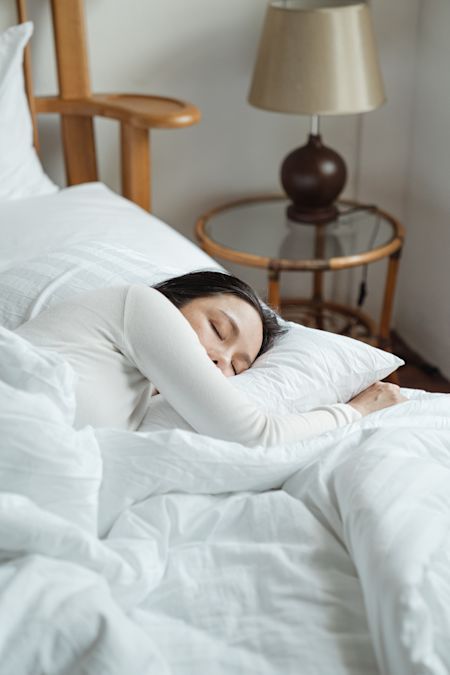The secret to falling asleep fast
If you struggle to fall asleep quickly, try these tips from insomnia expert Kathryn Pinkham.
Save £80 and feel fitter, healthier and happier – together.

We know that sleep is important, but do we really understand what sleep is and why it is so critical for our health and wellbeing.
We all sleep, but do we really know what it is? Sleep can be split into two types. We have non repetitive eye movement sleep (non REM) and reptitive eye movement sleep, also known as dream sleep. Throughout the night you go through a sleep journey, dipping in and out of non REM and REM sleep within a 90 minute cycle.
Both REM and non REM sleep are important for our mental and physical wellbeing. Non REM sleep helps our bodies recharge and repair, and boosts our immune system. REM sleep is essential for brain function and helps process memories, information and emotions. We tend to have our most vivid dreams during REM sleep.
1. It helps us regulate our mood
We all know that if we get a bad night's sleep, the next day we are irritable, grumpy and low. Research has shown that if we are deprived of sleep for just one night, we are 60% more reactive to negative experiences and it's harder for us to regulate our emotions.
2. It helps us make better decisions
Sleep helps us make smarter decisions in all aspects of our life, especially when it comes to our food choices. When we are sleep deprived, the levels of hormones (called leptin and ghrelin) that regulate our appetite can shift. We are more likely to be drawn to energy dense foods, and our brains are less effective at registering when we are full and satisfied by our meals.
3. It keeps our bodies healthy
Sleep is essential for repair and growth, and helps regulate our vital systems, which reduces the chances of developing conditions such as diabetes, obesity and cardiac and respiritory issues.
1. Get into a routine ⏰
Keep your body clock happy. Try to go to bed at the same time every night and set the same alarm every morning. We as humans thrive off routine, and so does our sleep.
Try to create a bedtime routine so your brain and body recognises when it's time to wind down. Change into your pjs, dim the lights, read a book, listen to a podcost, whatever helps you relax.
2. Keep it cool 🧊
Your core temperature needs to reduce for you to get a good night's sleep. Try to stay cool and maintain a cooler temperature in your bedroom. You could open the window to get a blast of fresh air for ventilation too.
3. Darkness is needed 🛌
In order to prompt melatonin production (the hormones that plays a role in the sleep/ wake cycle), your body needs to be in a dark environment, so get those blinds shut and turn the lights off.
4. Get up if you can't sleep 📖
If you don't fall asleep within 25-40 minutes, don't wait it out. Get up and do something relaxing until you feel sleepy and then try again. You don't want to associate your bed with not being able to sleep.
5. Reduce caffeine and alcohol ☕️🍺
Caffeine is a stimulant so try and reduce your intake as early on in the day as possible. Alcohol is a sedative, but doesn't help with good quality sleep, so try to limit how much you drink too.
We know that getting more sleep is often easier said than done. If you're struggling, try to make one small change this week. Even if you get a few more minutes rest, you will be winning!
This article comes from the Joe Wicks Podcast episode where Joe speaks with sleep expert, Dr Matthew Walker. You can listen to the full conversation here.